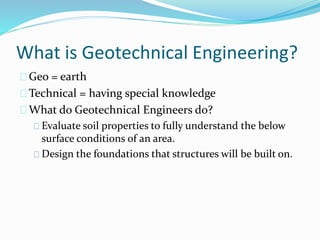What Does Geotheta Do?
What Does Geotheta Do?
Blog Article
Not known Facts About Geotheta
Table of ContentsGeotheta Can Be Fun For EveryoneThe Buzz on GeothetaThe Best Strategy To Use For Geotheta8 Easy Facts About Geotheta DescribedMore About Geotheta

They carry out website investigations, gather examples, execute research laboratory examinations, and assess information to evaluate the viability of the ground for building and construction tasks - Geotechnical Engineers. Based upon their findings, geotechnical engineers give referrals for foundation design, incline stability, retaining frameworks, and reduction of geotechnical hazards. They team up with various other professionals, such as designers, structural engineers, and building groups, to guarantee that geotechnical considerations are incorporated into the overall project style and implementation
By examining the behavior and homes of dirt and rock, they can identify prospective geotechnical hazards such as landslides, dirt negotiation, or incline instability. Their proficiency assists avoid failures or crashes that might threaten lives and property. Here are some thorough obligations and duties of a geotechnical designer: Website Investigation: Geotechnical designers conduct website investigations to collect data on subsurface problems.
They analyze the information to understand the properties and habits of the dirt and rock, including their toughness, permeability, compaction attributes, and groundwater conditions. Geotechnical Evaluation and Design: Geotechnical designers analyze the data accumulated throughout site investigations to examine the security and suitability of the website for construction projects. They perform geotechnical calculations and modeling to evaluate elements such as bearing capacity, settlement, incline security, lateral planet pressures, and groundwater circulation.
Our Geotheta PDFs
Foundation Design: Geotechnical engineers play an important duty in developing foundations that can safely sustain the intended structure. They analyze the dirt conditions and tons needs to identify the proper foundation type, such as superficial foundations (e.g., grounds), deep structures (e.g (https://www.easel.ly/browserEasel/14498559)., heaps), or specialized techniques like soil renovation. They consider factors such as settlement limitations, birthing ability, and soil-structure communication to establish ideal foundation layouts
They assess building strategies, screen site activities, and conduct area examinations to verify that the design recommendations are complied with. If unforeseen geotechnical issues arise, they examine the circumstance and give recommendations for removal or adjustments to the style. Danger Evaluation and Reduction: Geotechnical engineers evaluate geotechnical hazards and threats related to the task website, such as landslides, liquefaction, or dirt disintegration.

Cooperation and Interaction: Geotechnical designers function closely with other professionals included in a project, such as architects, structural engineers, and building and construction groups. Effective communication and cooperation are vital to integrate geotechnical considerations right into the overall project style and building and construction process. Geotechnical designers supply technological experience, solution inquiries, and ensure that geotechnical requirements are met.
Little Known Questions About Geotheta.
Below are some kinds of geotechnical engineers: Structure Engineer: Structure engineers specialize in designing and examining foundations for structures. They analyze the dirt conditions, tons demands, and website attributes to determine one of the most appropriate structure type and design, such as shallow structures, deep foundations, or specialized strategies like stack foundations.
They evaluate the aspects affecting incline stability, such as soil buildings, groundwater conditions, and slope geometry, and develop approaches to avoid slope failures and alleviate risks. Quake Engineer: Quake engineers concentrate on evaluating and making structures to withstand seismic forces. They analyze the seismic hazard of a website, assess soil liquefaction potential, and develop seismic layout criteria to make sure the security and strength of frameworks during earthquakes.
They execute field screening, accumulate samples, and examine the accumulated data to define the dirt properties, geologic formations, and groundwater conditions at a site. Geotechnical Instrumentation Designer: Geotechnical instrumentation engineers focus on monitoring and determining the behavior of dirt, rock, and frameworks. They set up and preserve instrumentation systems that monitor factors such as dirt negotiation, groundwater levels, slope activities, and structural variations to analyze efficiency and supply very early cautions of prospective concerns.
The Geotheta PDFs
They carry out examinations such as triaxial examinations, consolidation tests, direct shear examinations, and permeability examinations to collect data for geotechnical evaluation and style. Geosynthetics Designer: Geosynthetics designers concentrate on the style and application of geosynthetic materials, such as geotextiles, geogrids, and geomembranes. They make use of these materials to boost soil security, strengthen slopes, give drainage services, and control disintegration.
They have a tendency to be investigative individuals, which implies they're intellectual, reflective, and analytical. They are curious, systematic, reasonable, analytical, and logical. Some of them are also social, meaning they're kind, generous, cooperative, individual, caring, handy, empathetic, tactful, and pleasant. Does this sound like you? Take our complimentary occupation test to discover out if geotechnical engineer is among your leading job suits.
In the workplace environment, geotechnical designers next page utilize specialized software program devices to execute calculations, develop styles, and evaluate data. They prepare reports, review task specifications, connect with customers and group participants, and coordinate task activities. The workplace setup supplies a favorable setting for research, analysis, and partnership with other specialists entailed in the task.
The smart Trick of Geotheta That Nobody is Talking About
They often check out job sites to perform website examinations, assess geotechnical conditions, and gather data for evaluation. These gos to involve traveling to different areas, often in remote or tough surfaces. Geotechnical designers might execute soil tasting, conduct tests, and screen building and construction tasks to guarantee that the geotechnical facets of the project are being executed correctly.
Geotechnical engineers also function in specialized geotechnical research laboratories. Geotechnical lab designers function thoroughly in these environments, managing screening equipment, running tools, and taping data.
Report this page